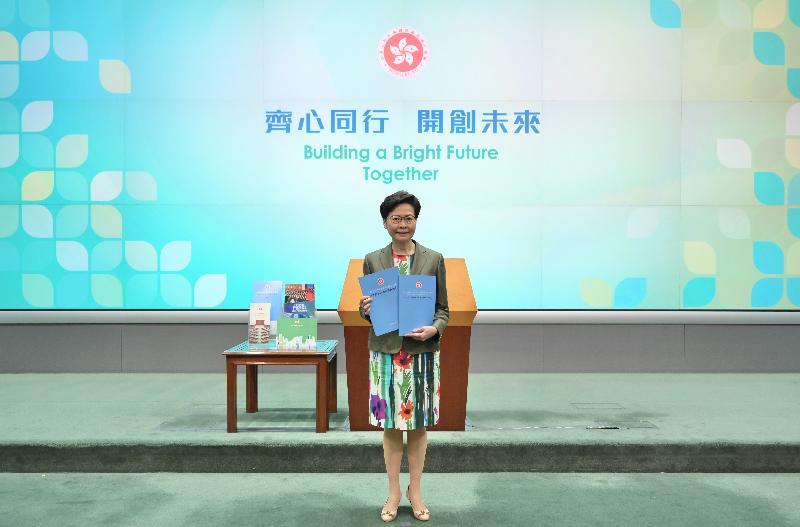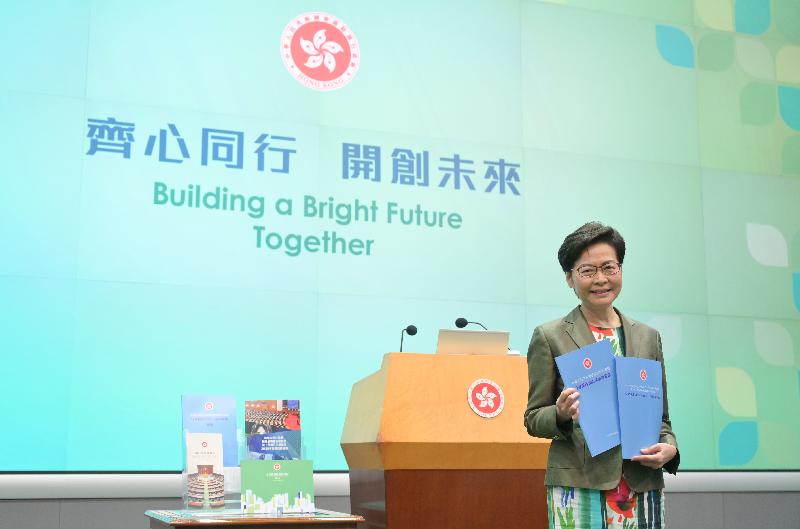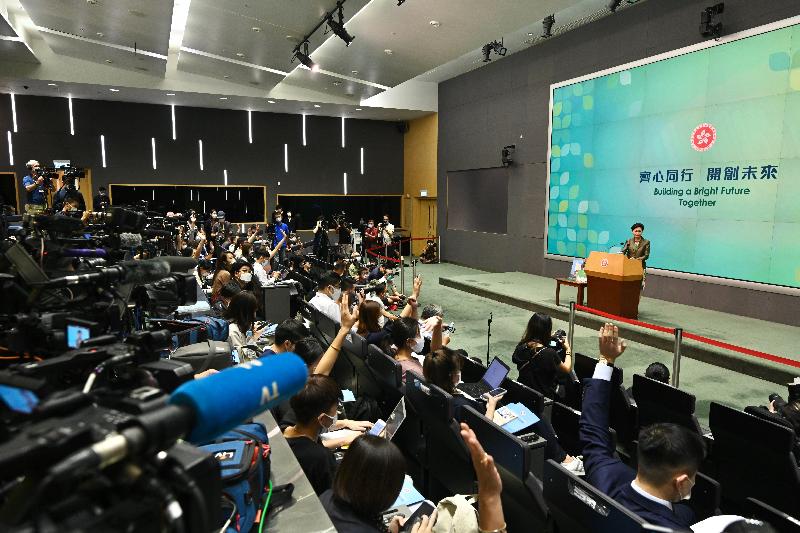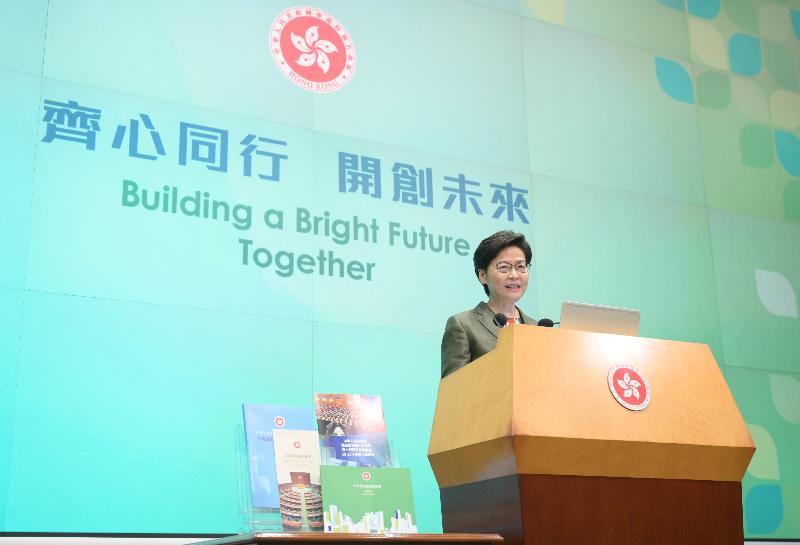Transcript of CE's press conference on "The Chief Executive's 2021 Policy Address" (with photos/video)
******************************************************************************************
Reporter: Good afternoon Mrs Lam. I have two questions. The first one is about healthcare. So you have proposed waiving the referral requirement for specialist consultation, but the waiting time for specialists is so long already, so what's exactly the point of adding even more people to the queue? And the second question is on the Northern Metropolis. So parallel travellers (parallel traders) have been troubling many North District residents before COVID. Are you worried that bringing more people into the North District will aggravate tensions between Mainland visitors and the residents again and harm social harmony? Thank you.
Chief Executive: Well, as far as the first question is concerned, I did acknowledge in my Policy Address that as Hong Kong is ageing, and ageing rather rapidly, there will be a heavy demand for medical services, whether in specialist consultations or in hospitalisation. We have been giving a lot more resources to the Hospital Authority (HA) in the last four years, I think over 40 per cent increase in budget, but the time has come that perhaps the HA needs to have a total re-examination of how they should provide services. For example, now there is much wider use and application of technology. There could be long-distance consultation, there could be telemedicine, there could be AI analysis instead of a radiologist reading an X-ray, and so on. The time has come for the HA, of course under the steer of the Secretary for Food and Health, to look at how they could improve the waiting time for the various services.
The second question about the Northern Metropolis, I do not quite understand your question. Apparently it's related to tourism. If there are more Mainland tourists coming in, then of course we will need to find ways to cater for their needs, their demands. If there are no tourists coming in, then people are complaining - because of COVID-19, no Mainland tourists are coming in and the businesses are complaining. We are always not in a comfort zone in dealing with this inflow of people. But the gist of developing the Northern Metropolis is to create land for housing as well as for industry in order that Hong Kong can move forward. Isn't it a much, much bigger objective than just dealing with the day-to-day congestion here and there? I'm sure we can deal with those micro-problems, managing the people flow, the burden on the local transportation. We need to think macro on what we want Hong Kong to be in the future, in the next 20 years or so. The Northern Metropolis is devised with that objective in mind and also to enable Hong Kong to integrate better into the national development, particularly the Greater Bay Area. Thank you.
Reporter: Hi, Mrs Lam. Why is there a need to build another rail link connecting Hong Kong to Shenzhen and Qianhai when we already have the Express Rail Link, the Hong Kong-Zhuhai-Macao Bridge and other land ports? Is Hong Kong going to foot the bill? Secondly, your administration has proposed easing land sale restrictions for ancestral land, but why can't the Government simply use the Lands Resumption Ordinance to take back those lands? Would this policy end up encouraging developers to hoard land? And also, given the vast amount of land in the New Territories (NT), is it still necessary to go ahead with the Lantau Tomorrow Vision project, which many critics say would be costly and harmful to the environment? And lastly, this is your last Policy Address for your current term. Looking back, how would you evaluate your work over the past five years, and are you going to run for the next Chief Executive Election? Thank you.
Chief Executive: I'm afraid you keep asking questions I will not answer. I will not answer any question about my own future. I would also not evaluate my own performance as the Chief Executive of Hong Kong, except to tell you that this Chief Executive does work very hard every day in order to serve the people of Hong Kong.
On the railway connection, I have been advocating an approach, that is transport infrastructure-led. In order to create land for development, in order to ensure that there will be easier flow of people and goods, you need good transport connectivity. To suggest that we don't need this connection between Hung Shui Kiu and Qianhai, I'm afraid you are going against the public opinion. Everybody who talks about the opportunities of Shenzhen and Qianhai for Hong Kong has been urging the Government to commit to this rail link. This is not a very long railway. If you look at a map, it becomes very logical that we should have a connection between the northwestern part of Hong Kong, that is Hung Shui Kiu, Ha Tsuen, Lau Fau Shan, and Qianhai, because it is just across the bay. It's about 5 kilometres, it would take 10 minutes, maybe. If there is a railway connection, it will take 10 or 15 minutes for a Hong Kong resident living in Hung Shui Kiu to go to work in Qianhai and vice versa. That is the importance and significance of this rail link, without which you will have to travel by car via the Shenzhen expressway, go to the border control point and then travel through the roads in Shenzhen to reach Qianhai. That's the difference. I have not found out the exact difference in time, but I think at least it will be half an hour, if not more, to travel without a rail link. That's the purpose of a rail link between Qianhai and Hung Shui Kiu.
About land owned by Tso/Tong, this is private land. The Government cannot resume private land for no purpose. I have told you some figures in the Policy Address that we have been resuming far more private land than the last five years, and we will resume some 700 hectares of private land in the coming years to support the various new town and NDAs (new development areas) in the northern part of NT. We will not shy away from using the Lands Resumption Ordinance to resume land for a public purpose, it will be either for infrastructure, building of schools or public housing. That would need planning, because in order to satisfy the public purpose, we have to have planning, we have to approve the public use before you could acquire the land.
Tso/Tong land is private land, and it has a very unique history to it. It's owned by people from the same ancestry. Over the years, because of the restrictions in the New Territories Ordinance, which authorises the government official, i.e. the District Officer, to agree or approve transactions of Tso/Tong land, and also the replacement of the trustee 司理, and because the law is unclear on under what circumstances could this District Officer agree or disagree, and previous court cases have indicated that you probably need 100 per cent consensus, and that makes it almost impossible to sell any land. Nowadays, how could you get anything that has 100 per cent consensus, especially when more and more second, third and fourth generations are joining the pool of eligible people to share the benefits of this Tso/Tong land? In order to release this land for development, which is the common aspiration of the NT people as well as the people involved in land development – they said that it is almost impossible, you are locking up unnecessarily perhaps thousands of pieces of land in the NT – in order to meet that common aspiration and to unlock the private land for development, we had to work with the Heung Yee Kuk to find a way that we could allow this Tso/Tong to dispose of their land in a more reasonable way but without sacrificing the interests of the descendants. That was the purpose of the initiative. To suggest that we need not do anything, just use government powers to resume, is not proper governance in my view, and I don't think you want me to go down that route, that we just blatantly take over anything that we want to take over. That is not what a civic and law-abiding government should do.
The third point is about Lantau Tomorrow. In the figures that I have presented to you, about more than 1 million housing units could be provided in the next 20 to 25 years – that has already included the units coming out of the Kau Yi Chau Artificial Islands reclamation, and it's quite a big share as well, so we could not forgo the reclamation. Of course, in Hong Kong there will be people disagreeing with anything we want to do. If we want to reclaim, they would say no; we want to touch the country park, no; now we are going into some of the wetland and fishpond, they will say no. But at the end of the day, common sense prevails and rationality prevails. Do we want Hong Kong to move forward? If we do, then the Government has to be far more decisive and determined in order to press ahead with the various developments despite some objections. I don't think there is a lot of resistance. On the financial side, time and again the real estate professionals have shown to Hong Kong people that this is a money-making business, because the land to be reclaimed and formed and sold will generate a huge revenue for the Government, not only to pay off for the infrastructure but also to go into the government treasury to support other activities. And on top of that, the Lantau Tomorrow project, particularly the Kau Yi Chau Artificial Islands reclamation, will meet other town planning purposes. It will give us a third CBD (central business district) of Hong Kong, with about four million square metres, which is about the size of the entire Kowloon East office space. It will improve the road and rail connectivity between Hong Kong Island, Lantau Island and the northwestern part of the New Territories.
As I said, I am not going to answer any question about my own future. This is indeed my final Policy Address in this five-year term, and I and my team will continue to work very hard to put in place as much as possible what we have announced in this Policy Address. Thank you.
(Please also refer to the Chinese portion of the transcript.)
Ends/Thursday, October 7, 2021
Issued at HKT 1:19
Issued at HKT 1:19
NNNN
Photo
Audio / Video
Press conference on "The Chief Executive's 2021 Policy Address"








